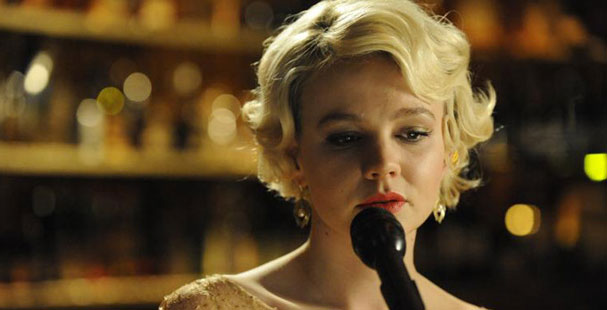Shame

Musing about "sex addiction," Stephen Merchant once wondered, can you be addicted to something you never actually get? If so, he said, then boy am I! I hear you, Merch.
I had a friend at an old job who liked to go through "The Sun-Times" in the lunchroom and pronounce his views on the subject of each article. One afternoon there was an article about sex addiction. He lowered the paper. Look, he proclaimed skeptically, if that's an addiction, then every man is addicted! (Not sure why he left the ladies out of his formulation.) And I guess that's the crux: at what point do you cross the line separating libido from addiction?
Perhaps when it becomes a problem in your life. Shot by director Steve McQueen (with whom he made the unforgettable "Hunger") so that he often looks like an embalmed corpse, Michael Fassbender's character in "Shame", Brandon, is able to hide his addiction behind a facade of New York success. He's good-looking and great with women (so long as they're strangers), his bearing not so much suave or smooth as respectful and charming. He makes eyes at a pretty young woman on the subway and she flushes with fantasies about what it would be like if he followed her off the the train. (If I tried that out, I'd get "What are you looking at, you bug-eyed, bespectacled, high-forehead, crooked-nose little freak?"). A lifestyle of porn, hookers, compulsive wanking and sex with strangers: this all worked for him, until it didn't. What precipitates the collapse? The arrival of his sister, Sissy, played by Carey Mulliigan.
What deeply damaged, self-destructive people, this brother and sister, not that McQueen judges them. Brandon outwardly seems to resent the hell out of Sissy, the way she's a slob, the way she can't sort out her life. But we begin to see that what he can't abide is the intensity of the strange bond between them. We gather that they must have survived a monstrous childhood by turning to each other. (There are scars up and down her arm where she's cut herself). Her expressions of intimacy cross the line into the slightly off, and seem to make him quite nervous: she doesn't bother to cover her nakedness from him at one point; at another she crawls into bed and snuggles up to him. What it is, is he loves her, and love is the one thing he can't bear. Brandon gets through life precisely by not making any connections, and here she comes, dredging up the past. In one scene he drives her from his room in a sudden outburst so startling that it surely took a year or two off my life.

A would-be sex scene between Brandon and a co-worker rings true. They had had one date where they had a real rapport, though he has, for once, been awkward and halting. When she undresses it's not like how one of his prostitutes does it. She's a little embarrassed, laughing at her own attempt to be sexy, a little self-conscious but aroused and encouraging, reacting to his touch with real arousal, having fun. It is very human. It's also the only scene in the movie that even comes close to being arousing--"Shame" makes you feel like having sex about as much as "Requiem for a Dream" makes you feel like shooting up a big syringe full of smack--and yet it's the one time in the film that Brandon can't get aroused. She is kind and understanding about it, but in his frustration he treats her coldly. It is a painful moment.
There is another shot that stays with me: a close-up of Brandon's anguished face during a pile-up with two women. It's twisted into a scarifying grimace. At a moment that should be bliss, the depth of sadness in his eyes is bottomless. It's a silent scream. In "Shame" sex is not the life force: it's a death trip, a reach for oblivion.
I also won't forget the scene where Fassbender and his hapless, clumsy boss, who always strikes out with the ladies, go to see Sissy sing. She sings "New York, New York" in a sustained, heartbreaking close-up. (And New York is very much a character in the film). When she comes to sit with them afterwards, the boss immediately senses in Mulligan a woman who for once is not put off by his flailing lines, and who might probably even sleep with him. Even though it's nothing to do with him--they're all adults--Brandon is clearly disturbed that his boss is about to score with his sister. We're as uncomfortable as he is.
And so "Shame" stays with you--you'll still be thinking about it days later--and yet by the end, I was as numb as the hero. There were moments when I was meant to be devastated and, quite honestly, I couldn't feel a thing. We watch a descent, but we can't go there too. It's so smartly acted: Fassbender makes himself naked here, not just physically but emotionally as well. And yet I found "Young Adult" a much more devastating film about a human being's collapse, Charlize Theron's vulnerability much more human and sad. In draining all color out of Fassbender's face, McQueen has also drained the film, giving it all the pallor, texture and warmth of snow-dusted ice on a frozen lake. This is no doubt intentional: even the walls of Brandon's apartment are white, and, without giving too much away, it's partly for that reason that a scene very near the end does hit home: when Brandon makes a terrible discovery, the red everywhere is a violent, shocking contrast to the blanched pallette to which we've become accustomed. In this scene, at least, anguish and love finally crack through the ice.
Key to ratings:
***** (essential viewing)
**** (excellent)
*** (worth a look)
** (forgettable)
* (rubbish!!)


 Scott Pfeiffer
Scott Pfeiffer
Reader Comments